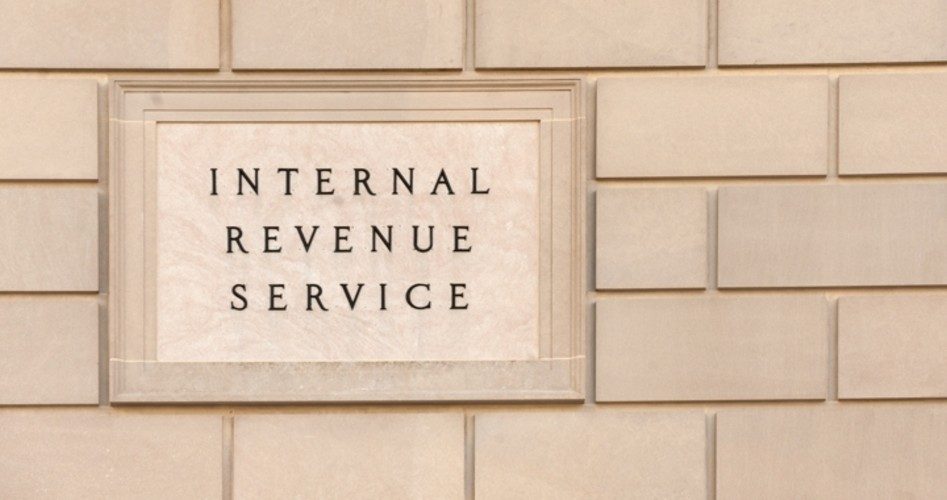
Complaints over lack of sufficient funding for the Internal Revenue Service (IRS) often appear at this time of year, just as taxpayers are beginning to focus on readying their tax returns due in April. This year is no exception. Whining over insufficient funding began with Dennis Ventry, the chairman of the IRS Advisory Council (IRSAC), who complained on Monday that Trump’s tax reform had created a “nightmare” for the agency. He lamented: “[IRS] personnel had to work on reform this year when they otherwise would have been working on something else. So, in some respects, it was a lost year.”
That lost year, Ventry opined, cost the federal government billions in taxes owed but not collected. And it’s all because Congress keeps cutting the IRS budget. As a result, the IRS now employs about 24,000 fewer full-time agents than it did back in 2010 (now down to a scant 76,000), with most of those cuts (17,000) coming from the tax-enforcement arm. Ventry estimates that the agency was unable to collect somewhere between $58 billion to $84 billion over the last eight years due to those cuts.
ProPublica and the Atlantic picked up on the agency’s troubles and co-published a 20-page defense of the agency, recounted its woes, and suggested that Congress (Republican-controlled, that is) was derelict in its duty to fund the agency sufficiently to collect all the taxes that were due.
They moaned that the rich were getting away with underpaying massively while those remaining enforcement agents were going after the little guy — the taxpayer who was so poor that he claimed the “earned income tax credit” (EITC) — without mentioning that the EITC has spawned an industry fraught with fraudulent advisors helping people who don’t qualify to get the benefit anyway.
They griped that the agency’s staff had been so emasculated that it didn’t have the resources to go after “nonfilers” or those who filed but didn’t include a check for what they owed. They lamented that agents didn’t go after those taxpayers hiding funds in overseas accounts because it took too long — up to three years — to find them, tax them, and collect the amounts due.
They warned that the agency is now so weak that word is likely to get out, that cheaters will multiply, knowing that the chances of their getting caught continue to diminish: “The IRS conducted 675,000 fewer audits in 2017 than it did in 2010, a drop in the audit rate of 42 percent.” They predicted that the damage done to the agency over the past eight years is so severe that it might not ever recover: “Agency veterans wondered whether the damage of the past several years will ever be undone. And they had a greater worry: that the American public will inevitably realize how weak the IRS has become.”
Little was mentioned in the jointly published defense that most of the damage done to the agency was self-inflicted. Think Lois Lerner. Think John Koskinen. It was Lerner who directed the branch of the agency that targeted conservative groups seeking tax exemption. It was Koskinen who took over the agency just after the scandal was made public and hid Lerner’s e-mails, destroyed them, and then lied about it to Congress. Impeachment papers were prepared by the House Oversight Committee, which accused him of failing to prevent the destruction of evidence in allowing the erasure of backup tapes containing thousands of e-mails written by Lerner, and of lying to Congress. Jason Chaffetz (R-Utah), the committee chairman, said that Koskinen “failed to comply with a congressionally issued subpoena, documents were destroyed on his watch, and the public was consistently misled.”
Neither of these miscreants was ever charged, convicted, or sentenced, and today they remain free to enjoy their retirement pensions from the government.
Of course, targeting wasn’t a new thing under Obama. Previous presidents used the tactic to attack their enemies as far back as FDR. Said Roosevelt’s son Elliott, “My father may have been the originator of the concept of employing the IRS as a weapon of political retribution.”
Included in the impeachment papers prepared for President Nixon (before he resigned) was this: “RESOLVED, That Richard M. Nixon … endeavored to … cause, in violation of the constitutional rights of citizens, income tax audits or other income tax investigations to be initiated or conducted in a discriminatory manner.”
The agency may be underfunded. It may not have enough agents to prepare themselves for questions arising from taxpayers over Trump’s tax-reform act. It may be leaving money on the table as a result. But at bottom, the agency not only has brought this upon itself by its past and recent unconstitutional behaviors, it also violates the principle that what a person earns he has a right to keep. Instead, through withholding, the government stands in front of the taxpayer to get its share first, allowing the taxpayer to keep what is left. There is no sympathy from this corner. The damage done was done by the agency itself.
An Ivy League graduate and former investment advisor, Bob is a regular contributor to The New American magazine and blogs frequently at LightFromTheRight.com, primarily on economics and politics. He can be reached at [email protected].



